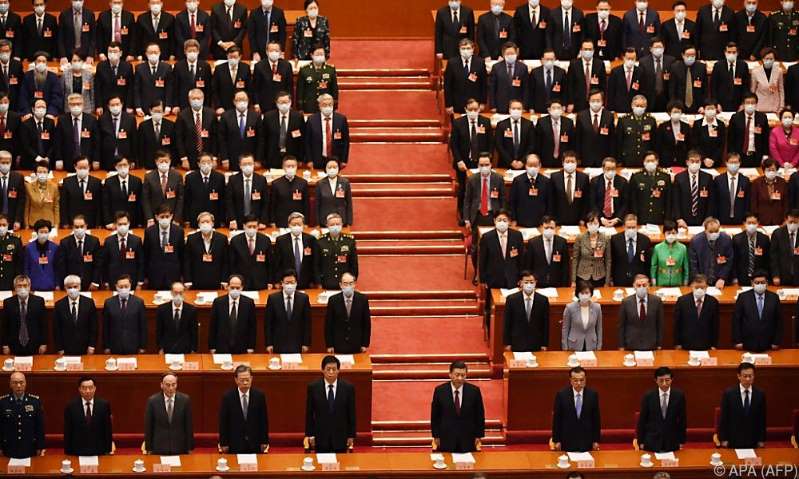China has tightened control over Hong Kong. At the end of its annual meeting, the People's Congress approved a change in the electoral system in Beijing on Thursday, which will further curtail the already limited democracy in the Chinese Special Administrative Region. The nearly 3,000 delegates in the Great Hall of the People also adopted the new five-year plan, with which China wants to make itself technologically and economically more independent from the rest of the world.

Image: APA (AFP)
The government wants to boost domestic demand and increase investment in research and development. This is intended to reduce dependency on foreign countries. According to Prime Minister Li Keqiang, China has a lot of catching up to do and wants to promote innovation. The strategy is also a response to the disruption of supply chains caused by US sanctions against China's tech companies and the global recession caused by the corona pandemic.
The People's Congress adopted the electoral reform for Hong Kong almost unanimously. Critics see another blow to the liberal system of the former British crown colony. The action met with outrage in Hong Kong and abroad, especially among the former colonial power Great Britain. “This is Beijing's latest move to undermine space for democratic debates in Hong Kong – contrary to the promises made by China,” said Foreign Minister Dominic Raab. It undermines confidence that China will still live up to its commitments as a leading member of the world community.
The Chinese premier defended the “improvements” to the electoral system designed to ensure that Hong Kong was “ruled by patriots.” After the decision, the committee for the election of the Hong Kong head of government will be enlarged from 1,200 to 1,500 members. In the selection of members, the already dominant pro-Beijing camp will gain even more influence, while the opposition forces will be pushed back.
A newly created “review committee” will also review the candidates for both the election committee and Hong Kong's parliament. This attitude test is about whether they are also “patriotic”. Critics see this practically as a veto right when the candidates are listed. From Beijing's point of view, “patriots” are only candidates who also follow the line of the Communist Party.
It is the second time in nine months that Beijing has tightened the reins in the face of protests and calls for more democracy in Hong Kong. In July, an equally harshly criticized security law came into force in Hong Kong, which has since been used to take legal action against democracy activists. It is directed against activities that Beijing sees as subversive, separatist, terrorist or conspiratorial.
While the fate of Hong Kong overshadowed the meeting, the not freely elected parliament finally approved the government's economic policy, as expected. Prime Minister Li Keqiang expects growth of “more than six percent” this year – after 2.3 percent in the previous year.
China benefits from the fact that it has largely had the coronavirus under control since the summer. Beijing is pursuing a “zero Covid strategy”: It uses strict measures such as curfews, quarantine, mass tests, contact tracing and extensive entry restrictions.
Against the background of growing tensions with the USA, India, Taiwan and neighbors in the East China and South China Seas, defense spending is also expected to rise sharply by 6.8 percent. China's head of state and party, Xi Jinping, called on the military to be “ready to fight” to defend the country's “national sovereignty, security and development interests”. He also called for a “high-profile strategic deterrent”.
At the same time, Li Keqiang underlined the common interests of the People's Republic and the USA. There are many areas for cooperation and he hoped that relations between the two states could develop in a healthy way. This should be based on respect for the respective interests, on cooperation in which both could win, and on non-interference in internal affairs. China will continue to open its economy to foreign investors, Li added.
Li spoke after US President Jen Psaki announced that President Joe Biden's administration was planning a first meeting between US Secretary of State Antony Blinken and China’s senior diplomat Yang Jiechi in Alaska next week. Biden's security advisor Jake Sullivan and Chinese State Councilor Wang Yi are expected to take part in the meeting next Thursday. The Ministry of Foreign Affairs in Beijing confirmed the appointment.

